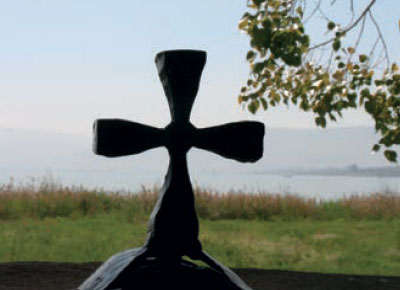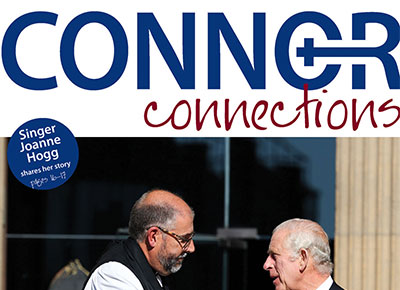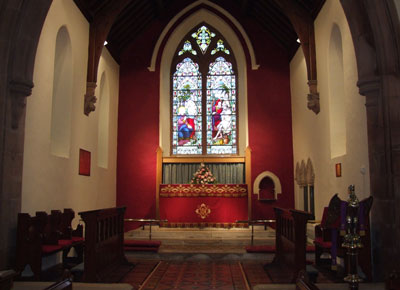DR Congo – forgotten, but not God–forsaken
 David Gough, CMS Ireland’s Partnership Coordinator, shares some reflections from his recent visit to CMSI’s Global Partners in the Democratic Republic of Congo (DR Congo).
David Gough, CMS Ireland’s Partnership Coordinator, shares some reflections from his recent visit to CMSI’s Global Partners in the Democratic Republic of Congo (DR Congo).
This is a very detailed report which is both moving and harrowing, upsetting and uplifting. David writes:
I returned from DR Congo inspired and blessed by the overwhelming welcome, generous reception, the homely hospitality afforded to me and well fed with ‘Irish’ potatoes.
Despite their circumstances and having little or nothing the church is alive and well. The Congo church is so industrious – they are the social service in Eastern Congo scraping from the little they have to provide Churches, Health Centres and Schools in many Parishes.
Although not my first visit to DR Congo – I first travelled there in 2003 while working for Concern Worldwide – this was my first visit to CMS Ireland’s partner Diocese’s of Bukavu, Kindu and North Kivu.
My lasting memory from that first visit is that the DR Congo was a God–forsaken place that had been stuck in time and forgotten by the world. It was as if nothing had changed since it gained independence from Belgium in 1960 and nothing worked. I also recall that even basics like salt and sugar had to be flown into the interior of the country.
DR Congo is a vast country with immense mineral resources including coltan, a vital element used in mobile phones, laptops etc., yet the Congo has been at the centre of what is known as Africa’s world war. The five–year conflict pitted government forces, supported by Angola, Namibia and Zimbabwe, against rebels backed by Uganda and Rwanda.
The Church has been on the frontline of the conflict in the east of the country and despite a peace deal in 2003, people remain in terror of marauding militia like the infamous Mai–Mai and Interhamwe, who today still use rape as a weapon of war. The war has claimed an estimated three million lives, either as a direct result of fighting or due to disease and malnutrition.
National and local elections took place on November 29 2011, and in the midst of the hopelessness of the situation there was a tangible sense of hope for a better future. During my visit I was greatly encouraged to hear that the Bishop’s viewed my visit as an example that things were changing…visitors returning was a real sign of hope.
I have so many encouraging stories I could share of how God is working in the hearts and minds of the people. Stories of crossing the Congo River in a dug–out canoe to preach at the Sunday morning service in Kindu, of being driven around by Bishop Masimango on a motorbike and of travelling 70km by road and then walking a further 7km with Bishop Bahati to attend the Confirmation of 22 young people in a remote Parish in the Congo jungle.
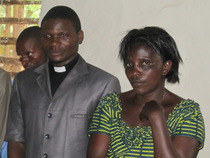 Supporting women and orphaned children
Supporting women and orphaned children
The following story is one example of how the Church is supporting women and orphan children in the Diocese of North Kivu. I first met the Rev Immanuel prior to the Sunday Service in Butembo Cathedral where I was to preach – he was introduced to me as my interpreter.
It was while talking to him, before the service, that I discovered that God’s call on his and his wife’s lives was much more than church ministry.
Immanuel and his wife Dorchas have three young children who share their home with 31 orphans on the outskirts of Butembo in the Diocese of North Kivu. While Dorchas was working as a midwife she and Immanuel adopted an orphan baby who later died at two years eight months. This experience changed their lives.
In 1996 Immanuel and Dorchas first opened up their home to the plight of young abandoned children, many the result of a culture among the opposing rebel armies of using rape as a weapon of war. The women and any babies born as a result of the rape are outcast from their own families and communities in many cases they are stigmatised for life.
This work has been recognised as a vital and central ministry of the Church in North Kivu by Bishop Isesomo. Since then they have been showing, in their words, ‘compassion for infants in distress.’
The following day I actually visited Immanuel and Dorchas in their ‘orphanage’ home. Accompanied by Bishop Isesomo and John, his Diocesan Secretary, I arrived at dusk to the joyous sound of unaccompanied singing and, when I walked inside I was welcomed energetic Congolese dancing by a room full of women and children. The women were from the local community and other churches who came together to pray and help with the children every day.
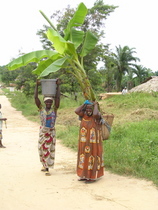 Dorcas explained: “Our vision is to show Christian compassion for infants in distress and we work with orphans from birth to 18 years of age, those who’ve been affected with HIV/AIDS as well as girls, some under 10 years, who have been raped. We also provide trauma and spiritual counselling and encourage others to pray for the ministry. We’ve even had to open an orphan school, because none of the local schools would accept the orphan children.”
Dorcas explained: “Our vision is to show Christian compassion for infants in distress and we work with orphans from birth to 18 years of age, those who’ve been affected with HIV/AIDS as well as girls, some under 10 years, who have been raped. We also provide trauma and spiritual counselling and encourage others to pray for the ministry. We’ve even had to open an orphan school, because none of the local schools would accept the orphan children.”
They also have two other centres in Kasindi and Malessi working mainly with Pygmy orphans. As well as talking to some of the orphans, I also met and some of the women who had been raped, and a teenage boy who was also raped. It was especially encouraging to meet Evelyn, one of the orphans, who now teaches in the school.
Dorchas said: “Our aim is to place the children in host families to give them the opportunity to be part of a family. We currently have 22 children in host families.
“Many of the rape victims are involved in the prayer ministry. One girl has not spoken since being raped three years ago. Our own Bishop visits every Friday and spends the day listening praying and fasting with the women,” Dorcas said.
She then told me of their plans to build a kitchen and dining area and extra bedrooms and showed me that they’d already started making the bricks. When I asked where they got the money to operate the work, she quietly said God and the good people of the community many who offer gifts in kind like food and clothes to the orphanage.
It was incredibly humbling as Dorchas showed me around their house, it was obvious the only private space they had as a family was their own bedroom. The other three bedrooms had three extra–wide bunk beds squeezed in so the orphans could sleep across the beds. When I asked where their own three children slept, Dorchas said ‘Among the orphans of course.’
I was deeply moved by experiencing genuine, sacrificial, Christian love of a couple who made a huge impact on me and that I’ll never forget.
A not–so–happy soul
During my visit to Kindu, I met one of the women who has been helped and supported by the Church after a horrendous ordeal.
Fifty two–year–old Mama Furaha lives in Kindu town. Her name Furaha means ‘happy soul’ but her story has not been a happy one, yet it is typical of all too many women in Eastern Congo.
While walking to collect firewood and forage for her husband and six young children, Furaha was attacked and raped by a gang of men – rebel ‘soldiers’ – who took her food and left her to die. Later that afternoon, Furaha’s husband ventured into the jungle to look for her and stumbled into the same gang of rebels who beat and raped him and killed him.
The following day another woman who was foraging for food discovered Furaha. She had been terrified to move or make a sound so had lain where she had been abandoned. The woman immediately brought her to the Mothers’ Union where she was offered care and support.
The women at the Mothers’ Union paid for Furaha to go to hospital to be treated for her wounds and to receive an HIV/AIDS test. They also organised childcare and provided her with ongoing support and trauma counseling. Furaha was then provided with a small Micro Credit loan to help rebuild her life and care for her children.
Although today she is still severely physically and emotionally scarred, Furaha is able to support her six children by selling dried fish, palm oil and cassava in the market. She says she is able to pay for school fees, clothes and health care for her and her family.
In DR Congo when women have been raped they are usually disowned by their husbands and family and treated as an outcast by the local community. The family usually orphans any children born as a result of the rape.
The Church is trying to change this culture by showing Christian love, care and support when people need it most.

Crossing the Congo to church
Not the normal mode of transport to a Sunday Service in Ireland, but then life is very different in DR Congo. Just imagine crossing the infamous River Congo in a 30 to 40–foot dug–out canoe with three motorbikes, the Bishop and a few of the Diocesan staff.
I knew from the previous day that I would be preaching in the main Church. It was an amazing experience, I departed from the Bishop Masimango’s home on the back of his motorbike and we drove the few miles to the banks of the River Congo.
The scene was almost biblical as dozens of dug–out canoes of all shapes and sizes, some with outboard engines and many relying on man power, competed for passengers. As our party’s three motorbikes were hauled aboard one dug–out all I could think about was there’s not a lifejacket in sight and what if we capsized!
What capped it all was instead of sitting on short lengths of bamboo wedged low to the deck between the gunnels of the canoe like everyone else, the Bishop was directing me to sit on a plastic chair! Just picture it – there I was along with the Bishop sitting erect in my plastic chair thrown, like King Leopold on my way to preach!
We arrived safely at the other side and as we disembarked along with our precious cargo I chuckled to myself – if only my family could see me now!
The three–hour service was amazing, with the highlight for me being the five choirs. The mainly male choir inspired us with their upbeat Congolese harmonious cappella singing, followed by the mainly younger and mixed Church Choir, then the women danced and sang, followed by the deep voices of the men in the congregation and finally the youthful vigour of the children and youth of the Parish.
It was truly astonishing and when I was invited up to introduce myself I encouraged them that this was true human voice worship and not to it be diluted by the introduction of electronic instruments.
Interestingly, during the remainder of my visit to the other two Dioceses, Bukavu and North Kivu, wherever I went there was amplification and electronics, even 70 kilometres from the town where there was no electricity supply, they used a car battery for power.
Incidentally, my address on the ‘Partnership in Mission’ from Philippians chapter 1, was enthusiastically received. At the end of the service I quite looked forward to the return expedition across the River Congo.
What a welcome
As I walked down the steps of the plane, as it arrived in Kindu after the hour–long flight from Goma, I noticed a throng of children spread along the boundary fence, literally surrounding the airstrip.
My first impression was that this must be part of some electioneering rally and that there must be some ‘Big man’ also arriving on the plane. My attention was then distracted as I noticed Bishop Masimango and a delegation from Kindu Diocese approach me as I neared the terminal building (wooden hut).
It was only as we were walking towards the exit gate of the airport that the Bishop asked me what did I think of the welcome and I discovered that there were in fact 480 children and they were from The Church Primary School and were not for some ‘Big man’ only for little old me! What a wonderful and humbling welcome for my first visit to Kindu Diocese, DR Congo.
The Church of Ireland Parishes of Milltown, Killyman and Dundalk group of Parishes have Parish Links to North Kivu Diocese in DR Congo. These Parishes have been faithfully praying for the Diocese and supporting with funds for the refurbishment of Churches and schools, funds for internet communication and supporting a bee–keeping project, to name a few.
If you would like to support the orphanage or CMS Ireland’s work in DR Congo please visit www.cmsireland.org or contact David Gough. CMS Ireland is actively seeking to develop and strengthen its links with the Diocese’s of Kindu, Bukavu and North Kivu. If you are interested in developing a Link with the Congo Church please contact David Gough at davidgough@cmsireland.org.
© Copyright The Church of Ireland Diocese of Connor 2024 | Web Design by LD2.digital
